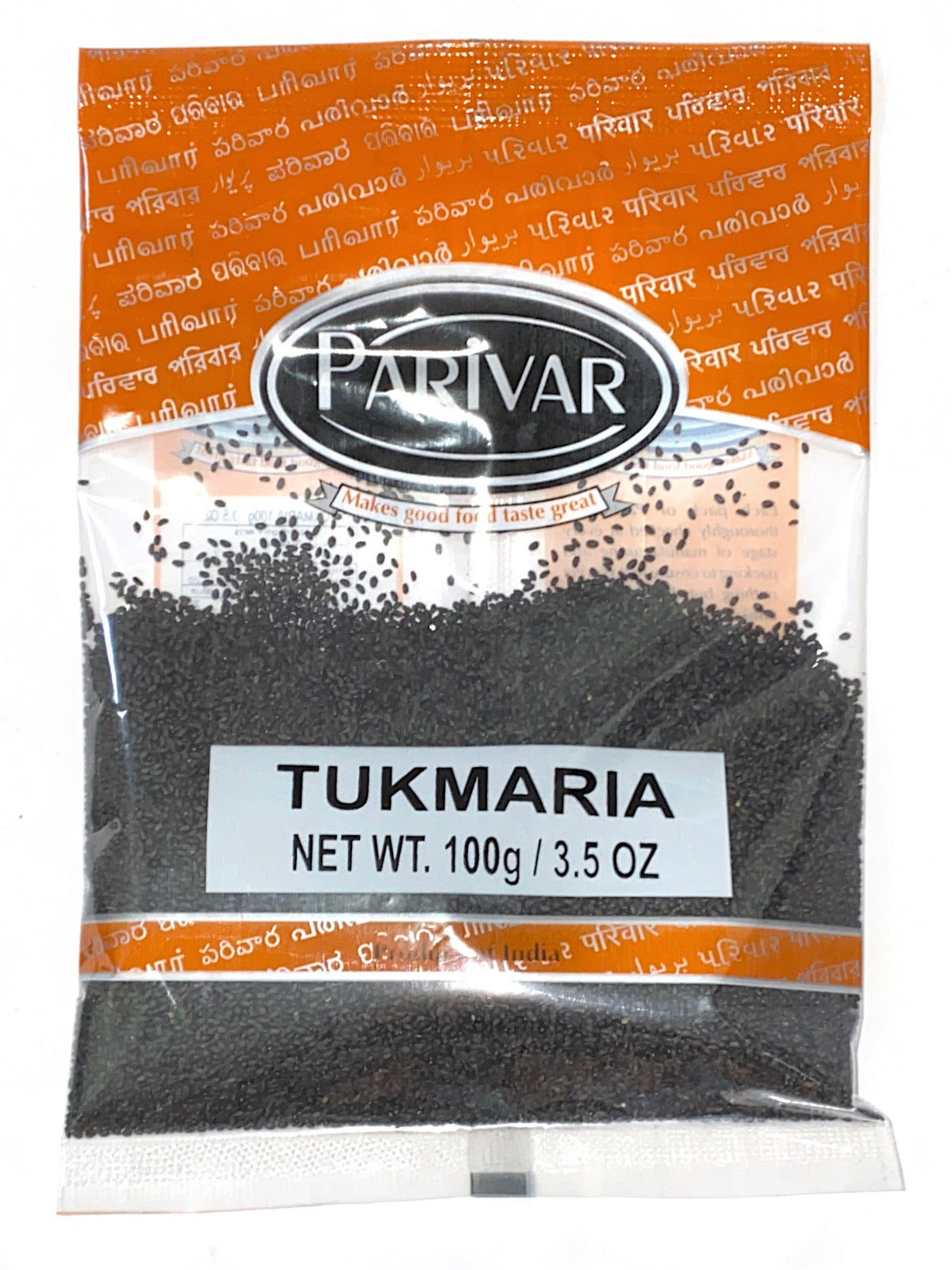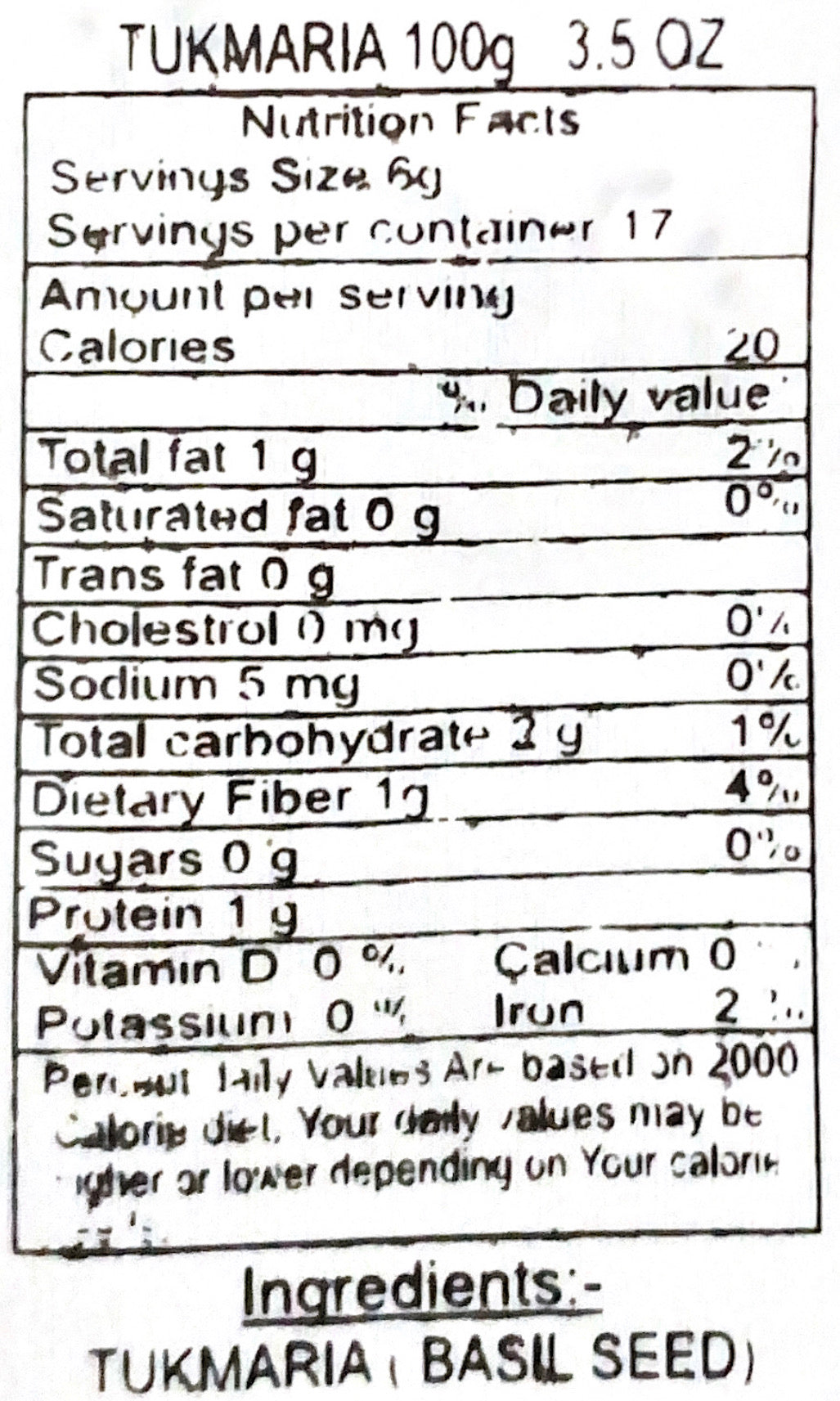Tukmaria (Basil Seeds)
- Product Weight: 100 g
- Category: Grocery & Gourmet Foods, Herbs & Spices, Out of Stock, Parivar, Whole Spices & Herbs
The type that you eat typically comes from sweet basil, Ocimum basilicum, which is the plant commonly used to season foods. For this reason, the seeds are typically referred to as sweet basil seeds. They also go by many other names, including sabja and tukmaria seeds.
Basil seeds have a long history of use in Ayurvedic and Chinese medicine, and their health effects have been tested in a few studies.
- Good Source of Minerals. Based on U.S. product nutrition labels, 1 tablespoon (13 grams or 0.5 ounces) of basil seeds supplies 15% of the Reference Daily Intake (RDI) for calcium and 10% of the RDI for magnesium and iron.
- Helps you meet your fiber quota. Just 1 tablespoon (13 grams or 0.5 ounces) of basil seeds supplies 7 grams of fiber — 25% of the RDI. Only about 5% of Americans eat enough fiber.
- May support gut health. Test-tube studies suggest that pectin has prebiotic benefits, meaning it may nourish and increase beneficial gut bacteria. This may include anti-inflammatory bacteria that support gut health.
- May help you feel full. Pectin may delay stomach emptying and increase hormone levels that promote a sense of fullness. Still, it’s uncertain whether eating basil seeds to curb appetite is an effective weight loss strategy.
- May aid blood sugar control. When people with type 2 diabetes ate 10 grams (3/4 tablespoon) of basil seeds in water after each meal for a month, their post-meal blood sugar was 17% lower than at the start of the study.
- May improve cholesterol. Pectin may lower blood cholesterol by inhibiting cholesterol absorption in your gut. People who ate 30 grams (7 teaspoons) of basil seeds daily for one month had an 8% drop in total cholesterol.
The type that you eat typically comes from sweet basil, Ocimum basilicum, which is the plant commonly used to season foods. For this reason, the seeds are typically referred to as sweet basil seeds. They also go by many other names, including sabja and tukmaria seeds.
Basil seeds have a long history of use in Ayurvedic and Chinese medicine, and their health effects have been tested in a few studies.
- Good Source of Minerals. Based on U.S. product nutrition labels, 1 tablespoon (13 grams or 0.5 ounces) of basil seeds supplies 15% of the Reference Daily Intake (RDI) for calcium and 10% of the RDI for magnesium and iron.
- Helps you meet your fiber quota. Just 1 tablespoon (13 grams or 0.5 ounces) of basil seeds supplies 7 grams of fiber — 25% of the RDI. Only about 5% of Americans eat enough fiber.
- May support gut health. Test-tube studies suggest that pectin has prebiotic benefits, meaning it may nourish and increase beneficial gut bacteria. This may include anti-inflammatory bacteria that support gut health.
- May help you feel full. Pectin may delay stomach emptying and increase hormone levels that promote a sense of fullness. Still, it’s uncertain whether eating basil seeds to curb appetite is an effective weight loss strategy.
- May aid blood sugar control. When people with type 2 diabetes ate 10 grams (3/4 tablespoon) of basil seeds in water after each meal for a month, their post-meal blood sugar was 17% lower than at the start of the study.
- May improve cholesterol. Pectin may lower blood cholesterol by inhibiting cholesterol absorption in your gut. People who ate 30 grams (7 teaspoons) of basil seeds daily for one month had an 8% drop in total cholesterol.
































